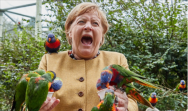
German election FARCE: Merkel to stay in charge for another ‘SIX MONTHS’ after key ballot
Angela Merkel heckled during speech in German Bundestag
We use your sign-up to provide content in ways you’ve consented to and to improve our understanding of you. This may include adverts from us and 3rd parties based on our understanding. You can unsubscribe at any time. More info
Experts are predicting a messy outcome to the defining federal election that will spell an end to Mrs Merkel’s 16-year reign as German Chancellor. Pollsters would suggest a late surge in popularity from the Social Democrats could usher in a left-leaning government for the first time in decades. But nothing is certain when Germans go the polls next Sunday with no one single party predicted to secure a stranglehold on the results.
Christian Odendahl, chief economist at the Centre for European Reform, suggested Mrs Merkel “will have to stay on as a caretaker government” while coalition talks take place.
He added: “The coalition negotiations are likely to take half a year or more.”
There are currently five different coalition options on the table and are decoded by a colour-coded system.
The current partnership of Mrs Merkel’s Christian Democrats and the Centre-left Social Democrats has been in power for eight years.


The two parties are unlikely to have a majority so could take in the Green Party to secure a comfortable power share in a black, red, green combination – known as the Kenya coalition.
Another option to keep the conservatives in power would be to the so-called Jamaica coalition – the centre-right Christian Democrats, the free market Free Democrats and the Greens.
The “Traffic light” coalition is a third example of what is possible, bringing together the Social Democrats, Free Democrats and Greens in a governing partnership.
Coalition predictions from risk analysts Eurasia Group have placed the Social Democrats’ Olaf Scholz as the most likely to become the next German Chancellor in any coalition – on 60 percent.

They give Mrs Merkel’s heir Armin Laschet a 40 percent chance in securing the top job.
In a detailed analysis, they suggest the so-called “Traffic light” coalition is the most likely outcome, on 45 percent.
This is followed by the Jamaica option on 30 percent.
Germany’s three main candidates to become chancellor clashed last night in the final televised debate ahead of Sunday’s election.
MUST READ: French MEP claims ‘every man for himself’ in post-Brexit Europe

The frontrunners outlined their plans for cooperation in Europe and a common approach to foreign policy.
Mr Scholz, favourite to take the crown, said his centre-left Social Democrats would back a united Europe that works closely with the US and Nato.
He said: “We are the big country in the middle of the European Union with the biggest population and the biggest economic strength.
“And therefore we need to make sure that Europe speaks with a more united voice.”
DON’T MISS
‘It’s unacceptable!’ Minister rages at EU over Protocol [INSIGHT]
Sturgeon branded an ‘international humiliation’ by Sarwar [VIDEO]
Covid panic: Cases surge by huge 36% in a week [ANALYSIS]
Germany: Business leaders discuss what’s at stake in election
Mr Laschet also spoke out in favour of a stronger and united Europe that cooperates on common military projects.
He said: “We need more Europe, we need to speak with one voice.
“We need to start projects together, also arms projects to be able to act together.”
Green Party candidate Annalena Baerbock spoke out about the need to find a common European approach to China.
“I want to make sure that we create a united, European approach toward China in which one EU country doesn’t get played off against the other,” she said.
Mrs Merkel has held the crown of German Chancellor since 2005 but has decided to step down and not seek a fifth term in office.
More than 60 million Germans are expected to go to the polls on Sunday to elect a new parliament and her successor.
Source: Read Full Article